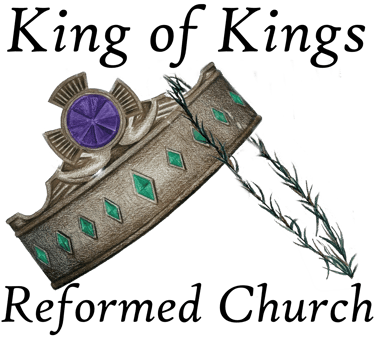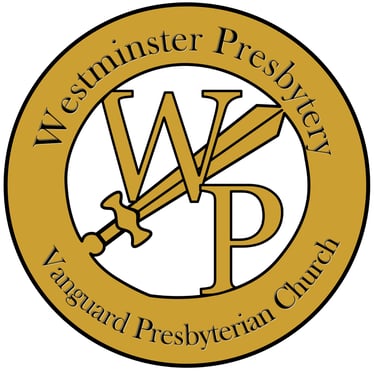Vanguard Presbytery: Questions that Deserve Answers
I frequently get emails or telephone calls from people asking questions about Vanguard Presbytery—how we got started, what is our relationship with other reformed denominations, what we believe, how we are governed, etc. The questions are usually similar enough that there is value in writing some general answers to them for this email.
Q 1. Why did Vanguard start a new denomination rather than unite with an existing denomination?
A. We looked at all the existing reformed denominations and concluded that there were fundamental problems with all of them. First, those of us who were in the PCA simply could not remain there any longer because of a number of issues—LGBTQ, the Federal Vision, the increasing development of the hierarchy of the General Assembly, the loose subscription to the Westminster Standards, the secrecy of the National Partnership, and other reasons. The problems were too numerous, too deeply entrenched, and too fundamental for us to have any hope that the denomination would or could be turned around.
Second, leaving the PCA and going into a denomination that has fraternal relationships with the PCA was counter-intuitive to us. Those fraternal relationships will pull other denominations down to the level of the PCA. In fact, the OPC is already trending in the same direction as the PCA. They allow exceptions to the Westminster Standards; they have problems with the Federal Vision; and, they have progressive ministers and churches. The URCNA, the RPCNA, and the ARP all have their own problems.
Third, we could not unite with any denomination that retained any control over the local congregation’s property. That eliminated most other reformed denominations immediately.
Q. 2. Why does Vanguard require full subscription to the Westminster Standards?
A. That question begs another question: Why not require full subscription? We are not saying that the Westminster Confession of Faith is a perfect document or that it is comprehensive. It is neither. Only the Scripture is infallible and inerrant. So, we do not require the same degree of subscription to the Westminster Standards as we do to the Scripture. We believe every word (ipsissima verba) of the Bible. We do not believe that the Westminster Confession of Faith was inspired, infallible, or inerrant. We do not believe that it always uses the very best language or could not be improved in some respects. We do believe that it is the best human statement of faith that has ever been devised. We are convinced that full subscription is the only way to preserve this denomination or any denomination. On the other hand, there are many illustrations of the dangers of allowing exceptions. What value is there in even having a confessional standard that supposedly represents your bedrock beliefs if you are going to allow officers to disagree with them. If they disagree, they can go into another denomination.
Q. 3. Did Vanguard seek to get a consensus from the other reformed denominations on your distinctives?
A. No, we did not do that. Instead, we did something better. We took the best examples of Reformed churches from the history of the church and we devised our distinctives from them. Those examples for us are: the first century churches founded by the apostle Paul; the Swiss Reformed churches at the time of the Protestant Reformation; the Free Church of Scotland in its early history; the New Side Presbyterians from 1741 to 1758; and, the Old School Presbyterians from 1838 to 1868. We felt that history was a better teacher and a better reference for us than trying to get some consensus from the modern Reformed churches.
Q. 4. What is Vanguard’s view on hierarchy and polity?
A. There is a strange attraction by Presbyterians to some form of hierarchy in church polity. I think that goes back to the Protestant Reformation. Reformed churches came from Roman Catholicism and, perhaps, have always been more comfortable in top down decision making rather than in truly Scriptural principles of polity. At the time of the reformation, things were turned around somewhat, but as the old saying goes, “The more things change, the more they stay the same.” Before the Reformation, the Roman Catholic Church ruled over both the church and the state. In the countries where the reformation took root, that was turned around, so that the state ruled over the church. Calvin’s consistory for St. Peter’s Church in Geneva had men who were representatives of the state. Things had changed in the sense that the Church no longer ruled over secular kingdoms and countries, but there was still control from the top. Calvin did not like that position and understood the Scriptural principles of church government. Nonetheless, he and other Reformed pastors had to endure a form of hierarchy.
In Vanguard, we have taken steps to prevent any hierarchical church government. The General Assembly will not have the power to control or dictate to the churches under them. The GA will decide legislative and doctrinal and judicial issues that are brought before them, but there will be no permanent committees that allowed to consolidate power and dictate to the churches of the denomination. The work of fulfilling the Great Commission will be done by local congregations and presbyteries where there is the possibility of proper oversight, encouragement, and accountability. It is impossible to carry out the work of the Great Commission at the General Assembly level. To whom are the missionaries accountable? They are not governed by a deliberative assembly (which all church courts are) but by a Coordinator and a few people under him. In other words, they are governed by an episcopal type system with the Coordinators being the Bishops. They are not governed by a Presbyterian church court.
Q. 5. Has not Vanguard already suffered a split?
A. No, Vanguard has not suffered a split. We did have a very few churches that had been in several denominations before applying for membership in Vanguard who have left us. They were unable to get along in other denominations and they proved to be true to themselves in Vanguard also. Some of their nastiness became evident to most people in Vanguard before they left, but most of their nastiness was directed at me and no one (not my wife, not Al Baker, not Rick Light, not the stated clerk, Thomas Joseph, not anyone) knows all they said and did before they left. I took it and bore it because I knew that those men would have no qualms in tearing Vanguard completely apart. Personally, I think that whole matter is a badge of merit for Vanguard. Most denominations have problems like that and try to placate trouble makers rather than shaking the dust off their feet. In a podcast with John Harris two years ago, I was asked how Vanguard would maintain purity. I told him we had to do two things—guard the front door and use the back door. It takes discipline at both doors. Vanguard had an attempted hostile takeover and we came through it well, in my opinion.
But, as far as splits are concerned, remember these facts. A year after calling the twelve as His disciples, Jesus referred to one of them as a devil. Every denomination and every congregation in the whole history of the church has suffered defections. I John 2:19 tells us to expect that to happen. Within a few years after the OPC was started, they split into two additional denominations—the Reformed Presbyterian Church Evangelical Synod and the Bible Presbyterian Church. Defections happen and it is not always a bad thing.
Q. 6. Is not Vanguard guilty of schism by not joining another existing denomination?
A. First, if the starting of Vanguard was schismatic, then every denomination in existence today is also guilty of schism. Schism did not originate in 2020. Of course, there is a more important question that first has to be answered. What is schism? According to the great John Owen, schism is causeless differences which do not strike at the heart of the gospel. Every reason that we had for leaving our former denomination had to do with things essential to the gospel. So, NO, Vanguard is not being schismatic for leaving the PCA.
Dewey Roberts, Pastor of Cornerstone Presbyterian Church in Destin, FL
www.vanguardpresbyterianchurch.com
Please mail any contributions to support the work of this denomination to: Vanguard Presbytery, PO Box 862, Destin, FL 32540




